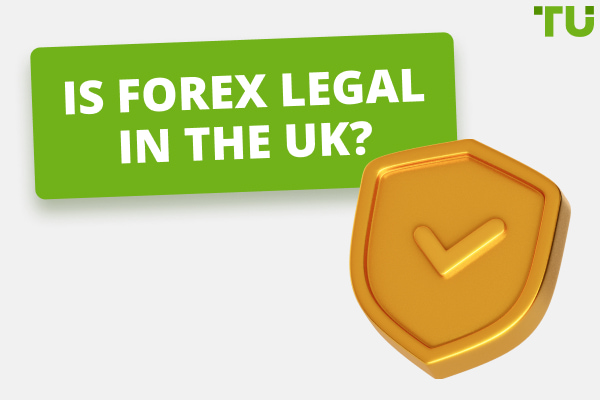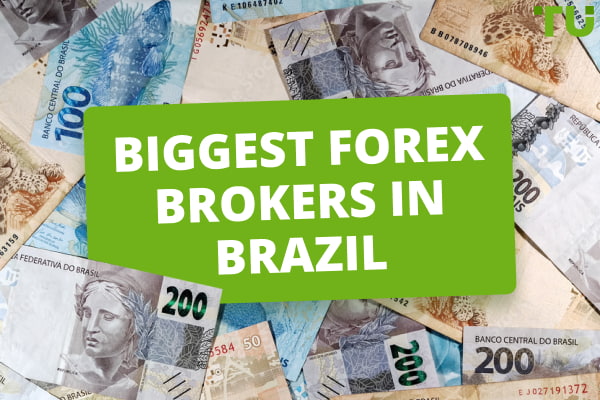Forex Trading In Ireland: All You Need To Know
Forex is legal in Ireland and you can trade with regulated brokers that accept users from Ireland. To start trading forex in Ireland you need to learn the basics, open a forex trading account, and deposit money.
While it is legal to trade Forex in Ireland, some prerequisites must be met to prevent problems or financial loss. The top priority of every trader in Ireland should be trading in a regulated environment. They must register with a regulated brokerage supervised by top financial bodies.
Secondly, they must learn about the factors or conditions surrounding Forex trading in Ireland. These include learning about Forex trading tax, the best time to trade Forex in Ireland, the best Forex brokers, and the minimum amount to start Forex trading in Ireland. TU experts have you covered if you seek answers to this and more on Forex trading in Ireland. Read on to discover more.
-
Is Forex trading in Ireland legal?
Yes. Forex trading is legal when executed with a regulated broker.
-
How is Forex trading taxed in Ireland?
In many Ireland tax statements, the payment of Forex trading tax is not made explicit. Experts have concluded that forex trading is typically considered tax-free, drawing a parallel with spread betting, which is not taxable in Ireland. Spread betting is viewed as a form of gambling, and as such, any gains from it are considered wager wins and are not subject to taxation in the country.
-
What is the maximum leverage for Forex trading in Ireland?
As a member of the European Union (EU), the maximum leverage offered by brokers is 30:1.
-
Can I trade forex with $10 in Ireland?
Yes. You can trade for $10 in Ireland. RoboForex is among the brokers offering traders the opportunity to trade with a minimum of $10.

Eightcap - Best Forex broker for 2024 (Ireland)
Best Forex Brokers in Ireland

Your location is United States
If you would like to learn about the best brokers in your region, please use the “Find my broker” service.
Is Forex trading legal in Ireland?
Short answer - Yes. Forex trading is a recognized activity that, with careful trading, many knowledgeable investors can profit from passively. It is legal for traders in Ireland to deal in financial instruments, such as spot Forex and contracts for difference, or CFDs for short. Dealing with unregulated brokers is what Forex trading in Ireland prohibits. This is in the trader's best interests since such brokers are likely to part with the trader's investment after some time.
The Central Bank of Ireland (CBI) is the regulatory body that authorizes and licenses Forex and CFD brokers in Ireland. Among the stringent requirements that brokers governed by the CBI must adhere to are anti-money laundering regulations and maintaining a minimum amount of business capital. Brokers are also required by the CBI to abide by the Markets in Financial Instruments Directive II (MiFID II) and the European Securities Market Authority (ESMA). This mandate requires Forex and CFD brokers to offer retail traders a negative balance protection policy, keep client funds segregated from their own, and participate in the Investor Compensation Scheme (ICS).
Ireland does not have restrictions on the presence of offshore brokerages, some of which are subject to foreign regulatory oversight. Therefore, you need to ascertain which financial service oversees the brokerage, which is not governed by CBI regulations, before registering with them. Below are the top financial regulators of many offshore brokers you trust for Forex trading in Ireland.
-
Cyprus Securities and Exchange Commission (CySEC)
-
The Financial Conduct Authority in the United Kingdom (FCA)
-
Australian Securities and Investments Commission (ASIC)
-
Seychelles Financial Services Authority (FSA),
-
Financial Markets Authority (FMA)
-
Bundesanstalt für Finanzdienstleistungsaufsicht (BaFin)
-
Financial Sector Conduct Authority ( FSCA)
How much money do I need to begin trading in Ireland?
Between $5 and $50 is ideal to start trading in Ireland, but you have to confirm what the brokers set as their minimum deposit.
While each broker has its own custom minimum deposit, potential traders must imbibe the character to refrain from trading or investing greater amounts from the onset. A trader has many factors to consider before trading with a broker in Ireland.
First is the broker's minimum deposit. If you are a beginner, you temporarily might have to avoid brokerages with high minimum deposits even though they offer more attractive spreads, advanced trading tools, zero commissions, etc.
A novice trader should choose brokers that offer low minimum deposits—anything between $5 and $100—or no minimum deposits. While a trader's choice of investment amount may be influenced by their financial situation, it is never harmful to start small. Additionally, even with a modest initial investment, you can begin working with brokers that incorporate some of the best trading tools to help you profit and control the risk of losing your money.
Take a demo account, for example. Brokers incorporate this account to assist traders in practicing foreign exchange trading, which is acknowledged as a high-risk investment. The purpose of the demo account is to teach novice traders the dos and don'ts of Forex trading. The broker finances the accounts, so a trader is free to learn how to trade with them but cannot take profits because they are not real accounts.
A cent account is another account that resembles a demo account; however, it is not free because you need to deposit money—basically, the minimum amount required by the broker. One advantage of a cent account is that it allows trades to be opened in cents, which is convenient for traders who have experience opening small positions on the demo.
Copy trading and PAMM accounts offer distinct advantages and differences. In copy trading, traders can replicate the strategies of experienced traders, essentially mirroring their trades. This allows for a potentially lower-risk approach, as the trader isn't solely reliant on their own decisions. On the other hand, PAMM (Percentage Allocation Management Module) accounts involve a manager handling the trading decisions, relieving the account owner of the need to trade.
When considering these options, traders should only risk money they can afford to lose in the volatile Forex market. Forex markets can be highly unpredictable, even during periods of stability, and unforeseen factors can lead to sudden and significant market shifts. Thus, in order to trade Forex profitably, one must be aware of the risks and make prudent investments.
How to choose the Best Forex broker in Ireland?
Forex trading in Ireland can be worth it when you trade with the best forex broker accepting clients from this jurisdiction. However, some factors to consider include:
-
Verify whether the broker is subject to regulation by a respectable local financial authority.
-
Select a broker with a reliable trading platform. Seek for platforms that are feature-rich, dependable, and adaptable. MT4, MT5, cTrader, and specialized platforms like XTB's xStation desktop platform are among the best.
-
Check the support and customer service track record of the broker. Knowledgeable representatives, prompt issue resolution, and round-the-clock assistance in your language are all important.
-
Check the broker's fees against those of other brokers. Examine average spreads on popular currency pairs and funding/withdrawal fees for your account. The spread, or the difference between a Forex pair's ask and bid prices, is what brokers usually charge as their commission.
-
Verify whether the broker offers leverage so you can use less capital to control a larger position.
-
Verify the broker's payment methods; choose those that offer vast payment methods.
-
Verify whether the broker provides demo accounts, instructional resources, and other tools to simplify trading.
Best time to trade Forex in Ireland
Forex trading in Ireland will peak between the hours of 12:00 PM and 4:00 PM GMT, which is the overlap between the London and New York sessions. If you are not familiar with the different Forex sessions, this might be a mystery to you. However, let's look at the different Forex sessions in Ireland.
Technically, Ireland, like other nations, integrates the four global Forex sessions, and below are the Forex trading sessions.
-
Sydney (Pacific Region) - Active between 22:00 and 7:00 GMT.
-
Time Zone: UTC+10 (Sydney, Australia).
-
Tokyo (Asian Region) - Active between 23:00 and 9:00 GMT.
-
Time Zone: UTC+9 (Tokyo, Japan).
-
London (European session) - Active between 8 a.m. and 17 p.m. GMT.
-
Time Zone: UTC+0 (London, United Kingdom)
-
New York (American session) - The market opens at 13:00 and closes at 22:00 GMT.
-
Time Zone: UTC-5 (New York, USA).
Traders in Ireland can compute the opening and closing times for each Forex trading session with the local time. For less than half the year, the time on the island of Ireland is the same as Greenwich Mean Time. In the summer, it changes to GMT+1, which is British Summer Time (BST) in Northern Ireland and Irish Standard Time (IST) in the Republic.
Because of the volume of trades that take place during these overlaps, the London/New York overlap is the best, as was previously mentioned. According to professional analysis, these two nations conduct the most transactions in a Forex trading session. The market gets even more volatile and liquid during this overlap.
The London session offers the highest volume on the Forex market, making it the ideal time to trade in a single session. London is a major financial hub for several large banks, financial institutions, and hedge funds. As such, the concentration of financial activity in London affects the session's liquidity and trading volume. It sees a lot of trading activity and has more buyers than sellers, which causes spreads to get closer.
Therefore, when the London session coincides with another session, it typically results in a market spike. There are several key times when Forex sessions overlap, providing traders with increased trading opportunities.
-
Sydney and Tokyo overlap from 7:00 GMT to 23:00 GMT.
-
Tokyo and London sessions overlap between 8:00 and 8:00 GMT.
Note:
The London and New York sessions have the biggest overlap and are also the busiest trading times. This overlap provides the highest liquidity for trading currencies. A trader's choice of Forex trading sessions depends on their individual trading methods, schedule limitations, and taste. In addition, traders should always apply suitable risk management techniques, regardless of the Forex trading session.
Best prop firms in Ireland
Do I Pay Taxes for Forex Trading in Ireland?
In many Irish tax statements, the payment of Forex trading tax is not made explicit. Even though Irish investors are legally permitted to trade a wide range of financial instruments, such as contracts for differences and spot Forex, the MiFID framework offers lower corporate tax rates and more transparent regulations.
Experts have concluded that Forex trading is typically considered tax-free, drawing a parallel with spread betting, which is not taxable in Ireland. Spread betting is viewed as a form of gambling, and as such, any gains from it are considered wager wins and are not subject to taxation in the country. This logic extends to forex trading, where gains are also not typically subject to capital gains tax (CGT). However, it's important to note that while gains from spread bets are not taxed, profits from the sale of tangible assets are subject to CGT.
On the other hand, profits made in Ireland from contracts for difference (CFD) are subject to capital gains tax. Nonetheless, tax is not due on CFD profits if trading is not a part of a business or trade. For most gains, the capital gains tax rate is 33 percent.
Can I Trade with Internationally Regulated Forex Brokers in Ireland?
Yes. Forex trading in Ireland with international Forex brokers is accepted in Ireland. Trading with Forex brokerages not subject to financial organization regulation is illegal. Therefore, before registering, prospective traders who want to trade with foreign brokers that accept traders from Ireland should make sure they have done their homework regarding the broker's regulatory standing.
Most professional traders in Ireland use foreign Forex brokers that are globally active and regulated by financial authorities in well-known countries.
In a nutshell, verify that the Forex broker is governed by respectable financial authorities before deciding to trade with one that is internationally regulated in Ireland. Examples include the Financial Conduct Authority (FCA) in the UK, the Australian Securities and Investments Commission (ASIC), and the Cyprus Securities and Exchange Commission (CySEC). Examine the broker's reputation by perusing reviews, visiting discussion boards, and taking into account comments made by other traders. Positive reputations tend to make brokers more reliable.
Additionally, confirm the degree of client fund protection offered by the broker. Some international brokerages invest in compensation funds, insurance, segregated account systems, and negative balance protection to protect their client's money.
Verify whether the broker accepts deposits and withdrawals from Ireland by checking their deposit and withdrawal options. Make sure their account funding and profit withdrawal options are easy to use and safe.
Experts opinion
Forex trading in Ireland is a legal and popular activity, with a growing number of individuals and institutions participating in the market. Unlike some countries where trading with offshore brokers is restricted or prohibited, Irish traders have the freedom to choose from a wide range of brokers based in other countries. This flexibility allows traders to access a broader range of markets and products, enhancing their trading opportunities.
Irish traders need to trade cautiously and avoid dealing with unlicensed brokers. Traders should not be in a rush to start making big profits because it is a good idea to start small. Since there is no guarantee of success for any open position in the Forex market, making large investments carries a risk.
Overall, forex trading in Ireland offers a safe and regulated environment for traders, with the flexibility to trade with offshore brokers. The regulatory framework provided by the CBI ensures that traders are protected, making Ireland an attractive destination for forex traders. So, if the right measures are followed, forex trading is a great passive income option for traders willing to play by the rules.
Team that worked on the article
Peter Emmanuel Chijioke is a professional personal finance, Forex, crypto, blockchain, NFT, and Web3 writer and a contributor to the Traders Union website. As a computer science graduate with a robust background in programming, machine learning, and blockchain technology, he possesses a comprehensive understanding of software, technologies, cryptocurrency, and Forex trading.
Having skills in blockchain technology and over 7 years of experience in crafting technical articles on trading, software, and personal finance, he brings a unique blend of theoretical knowledge and practical expertise to the table. His skill set encompasses a diverse range of personal finance technologies and industries, making him a valuable asset to any team or project focused on innovative solutions, personal finance, and investing technologies.
Dr. BJ Johnson is a PhD in English Language and an editor with over 15 years of experience. He earned his degree in English Language in the U.S and the UK. In 2020, Dr. Johnson joined the Traders Union team. Since then, he has created over 100 exclusive articles and edited over 300 articles of other authors.
The topics he covers include trading signals, cryptocurrencies, Forex brokers, stock brokers, expert advisors, binary options. He has also worked on the ratings of brokers and many other materials.
Dr. BJ Johnson’s motto: It always seems impossible until it’s done. You can do it.
Mirjan Hipolito is a journalist and news editor at Traders Union. She is an expert crypto writer with five years of experience in the financial markets. Her specialties are daily market news, price predictions, and Initial Coin Offerings (ICO). Mirjan is a cryptocurrency and stock trader. This deep understanding of the finance sector allows her to create informative and engaging content that helps readers easily navigate the complexities of the crypto world.















